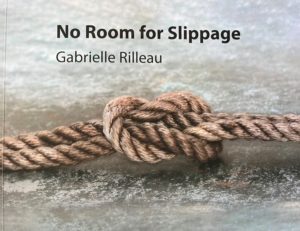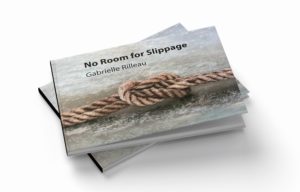Fishing villages know the sea will take what it wants. Storms roll in, boats sink, and accidents happen. In her new book of poems, No Room for Slippage, Gabrielle Rilleau captures her unconventional midcentury upbringing in Provincetown and the heart of a small town big enough to cope with unbearable loss.

Rilleau’s parents were artists, and her father, Roger, claimed to be the first sandal maker in Provincetown. Her family depended on summer work for making money, and their long winters were often lean. But the Rilleaus made do. In good years, they owned their own house; in harder ones, they lived in the back of their rented sandal shop or in their truck, affectionately called “The Blunderbus.”
Fittingly, Rilleau opens her collection by evoking a sense of place in the aptly titled “Home,” which begins with a description of the beauty of the sea:
This place of shifting skies
where draggers push
beyond the cresting waves
through early morning fog
to the outer banks
in hopes of a good week’s haul
The sea, however, is also a source of menace and unpredictable danger. Rilleau reminds the reader that it is the place
Where a father strapped
his drowned son’s body to the weirs
while he swam to shore for help
Where too many fishermen —
brothers and sons, are lost forever
betrayed by the sea of their youth
The poem drifts back into softer memories of street vendors and children playing before it concludes with a description of Provincetown that still resonates today:

It is this place to which
you forever return
to forget
and to remember.
In “Off Bradford,” Rilleau describes summer camping in the woods with her family. Her parents slept in an old box trailer with her baby brother, Kim, while Rilleau and her sister Robin slept in cots in a platform tent built by her father. A refrigerator crate became an outhouse. Her father dug a well. Their world is a safe haven until the sisters encounter an old man who chases and threatens to kill them. Rilleau’s mother offers comfort, but their sense of security is lost:
Robin and I never again
walk alone down by the railroad tracks
Not to pick
Mayflowers or blueberries or winterberries
Not to look for treasures in the dump
Nor to play with any kind of abandon.
Darkness creeps into the poems in other ways. Rilleau doesn’t shy away from describing her father’s drink-fueled rages, which included battering the inside of the house with an ax and shooting holes in the laundry basket when there were no clean socks.
The book includes a six-part narrative about a fishing boat with no engine that her father traded a bicycle for. He has it towed to Pamet Harbor in Truro, where he starts to repair it, telling his family they will use it to hunt treasure. But a hurricane comes and slams it against the shore, ripping it open. The boat, and the dream, are finished.
What lingers most in Rilleau’s work is affection for a town that always cared for its own. Tongues wagged at her family’s unconventional life, but they were also embraced and helped. Her poems conjure colorful characters like Phat Francis in his overalls and stovepipe hat; Popeye and Crazy Helen; and the Cook family, who owned the legendary Cookie’s Tap.
Rilleau also jumps forward in time to look at her adult self in poems about the house she now owns in California and about coming back to Provincetown for the summer, where she finds as much connection as ever. She searches for a piece of wood for her mantel in the yard of George Bryant’s house across from the Art Association. Bryant could never resist holding on to something that he felt still had some use in it — and he provides Rilleau with the perfect slab of hemlock that he says is right for her:
It’s from the church
he said in a deliberate voice
the old Methodist church he repeated
to be sure I understood
he meant the one we both attended
over 50 years ago
where at 13 I’d been baptized.
That church was later bought by Walter Chrysler for his eponymous museum before it became the Provincetown Heritage Museum and finally today’s town library.
Rilleau’s work is full of such details, in which time, memory, history, and legend comingle with one another. No Room for Slippage is a gentle and satisfying look back at a Provincetown that was — with more than a few sharp edges.
